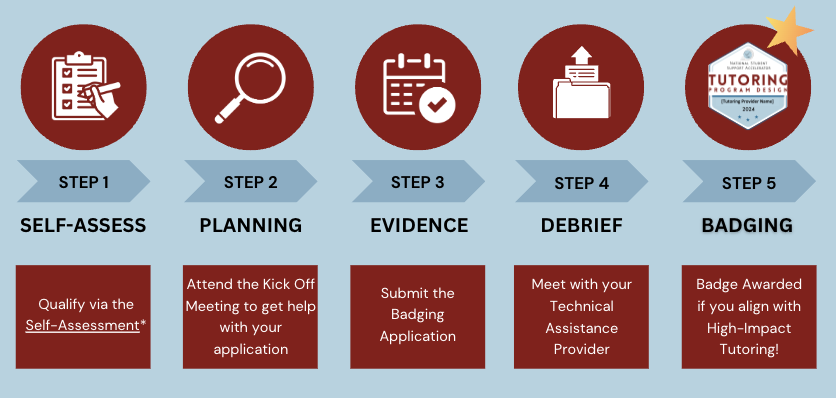Introducing the NEW Tutoring Program Design Badge
Tutoring Providers can apply for our Badge to understand their tutoring program’s alignment to high-impact standards, learn how to improve, and showcase their program design to states and districts.
There is no cost to apply for or receive the Badge. Review our FAQ below for details, and contact tqis@studentsupportaccelerator.org for any additional questions.
Start the process now by completing the new and improved Self-Assessment today.


Frequently Asked Questions
The NSSA Tutoring Program Design Badge indicates how well a tutoring program’s design aligns with fundamental Tutoring Quality Standards based on provided documentation. The badge is meant to act as a first filter to states and districts for quality to indicate that a program has a research-aligned program design.
The badge does NOT offer insight into how well implementation occurs, because conditions within each tutoring site (i.e., reliability of tutors, time constraints of different sites, student absences, etc.) will vary. The Tutoring Program Design Badge, therefore, should not serve as a shortcut for users to understand applied effectiveness. Instead, those seeking tutoring programs should still be conducting due diligence to find a program that fits their individualized needs.
Tutoring Providers are eligible to apply for the badge if they have self-identified as fulfilling the requirements of the badge in the Self-Assessment. Districts with home-grown tutoring programs seeking continuous improvement are also eligible.
Districts can request a tutoring provider to go through the process before contracting, and the provider would still begin by qualifying through the Self-Assessment.
Program models will be evaluated based on the Tutoring Quality Standards, which were developed by a group of researchers, tutoring providers, and district leaders. The standards are separated into domains that describe the different elements of a program that research has shown to improve outcomes for students participating in high-impact tutoring programs.
Indicators used in the badging process include:
- Tutor Recruitment + Selection
- Tutor Preservice Training
- Student-Tutor Relationship
- Program Effectiveness and Improvement
- Formative Assessment
- Student Progress Measure
- Tutor Coaching and Feedback
- Tutor Consistency and Ratio
- High-Quality Instructional Materials
- Dosage, Setting, and Integration with School Schedule
- Safety Protocols
- Data Privacy and Security
- Program Design
- Organizational Culture
At a high level, the Badging Process consists of five steps:
- Self-Assessment – During this step, the tutoring program completes the Self-Assessment. The Self-Assessment is analyzed by NSSA, and programs that meet the threshold for badging are invited to attend a Kick-Off Meeting.
- Planning- Attend the Kick Off Meeting, where you will get some assistance and more information about how to apply for the NSSA Program Design Badge
- Evidence – After the Kick Off Meeting, the tutoring program provides the NSSA with the requested documents by adding appropriate links into the Documentation Collection Form.
- Debrief – A third-party evaluator or Technical Assistance Provider (TAP) conducts an introduction meeting to introduce themselves and gather any evidence missing from the application. The TAP then determines a level of alignment and makes recommendations in the final report that is shared with the tutoring program for review in a final debrief meeting.
- Badging- The NSSA Program Design Badge is awarded when the program meets the fundamental standards set forth by the NSSA for effective program design.

Submitted documentation will be assessed by Technical Assistance Providers (TAPs), third-party evaluators contracted by the NSSA. TAPs are education leaders and experts and are trained to use NSSA’s evaluation system to provide feedback to providers.
Programs can submit their documents for review on a rolling basis but should be submitted between two to four weeks of attending an initial Kick-Off Meeting.
The report and badge determination will typically be returned within a six-week period from the submission date, based on demand and capacity.
The Tutoring Program Design Badging Process is completely free.
The badge will help solve several challenges for both tutoring providers and the districts and states who contract with them:
- Standing out in a crowded field: Districts and states have difficulty differentiating quality programs. An increasingly oversaturated market makes it particularly difficult for high-impact tutoring providers to stand out. The goal of the badge is to offer a way for research-aligned programs to showcase their quality program design.
- Clarifying high quality based on research: Some tutoring programs claim to be “high-impact” without aligning to high-impact standards. The badge will offer clarification on a program’s adherence with “high-impact” tutoring as defined by the National Student Support Accelerator at Stanford University.
- Informing the field on effective practices: A lack of evidence from less effective tutoring programs overshadows the value of high-impact tutoring. In an effort to inform the field on research-backed effective practices in tutoring models, this badge seeks to communicate those distinguishing features and practices in a clear and engaging way.
This Badge is valid for 3 years. After this period, you will need to apply for a revalidation. If you have not applied for revalidation by the time your Badge expires, your Badge will expire and be removed from our website. You are also expected to cease displaying the Badge on your website, emails, and promotional materials.
See the full list of Badge recipients here.